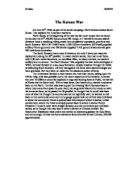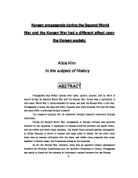The Korean War
On June 25th, 1950, as part of the soviet campaign, North Korea invaded South Korea. This explains the American reactions.
North Korea, at the beginning of the war had far more troops than the South. On Sunday the 25th, 90,000 Soviet armed NK troops, in 7 heavily armoured assault divisions made a headlong rolling smash into completely unprepared, poorly armed South Koreans. With 150 T34/85 tanks, 1,700 122mm howitzers, SU76 self propelled artillery 76mm guns and over 200 Soviet supplied YAK ground-attack aircraft gave NK total force domination.
On June 25th, 1950, as part of the soviet campaign, North Korea invaded South Korea. This explains the American reactions.
North Korea, at the beginning of the war had far more troops than the South. On Sunday the 25th, 90,000 Soviet armed NK troops, in 7 heavily armoured assault divisions made a headlong rolling smash into completely unprepared, poorly armed South Koreans. With 150 T34/85 tanks, 1,700 122mm howitzers, SU76 self propelled artillery 76mm guns and over 200 Soviet supplied YAK ground-attack aircraft gave NK total force domination.







